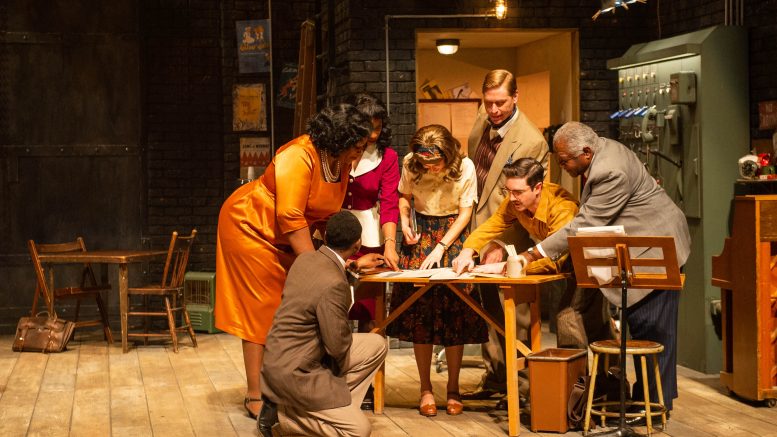Alice Childress was almost the first Black woman playwright to have her work appear on Broadway in 1955 with her wry and potent meta-comedy Trouble in Mind.
But when producers requested a happier ending and a name change that would appeal to white audiences, Childress declined. The play would not see the light of Broadway for more than 60 years.
Childress was staunchly principled and an ardent unionist. The first time Trouble in Mind hit the stage at Greenwich Mews Theatre, Childress did bend to producers’ requests to write an ending that suited them, but only because she did not want to put the cast and production team out of work.
Ironically, Trouble in Mind’s main character navigates racism in the theatre of an almost identical kind to what Childress dealt with in writing the play.
The play follows Wiletta Mayer, a Black actress utterly enamored with theatre. Wiletta is almost Childress’s inverse. She is constantly conscious of her white colleagues’ and directors’ delicate egos, and she is willing to be a yes-man so long as she can spread her wings on stage.
But when Wiletta is cast in a hokey play packaging anti-Black racism in troublingly stereotypical, feel-good wrapping, she winds up at odds with the play’s white director. What little camaraderie the play-within-the-play’s Black and white cast and crew members build is rife with friction.
Trouble in Mind does not present racism as a cold extreme centralized in one villainous white figure whom white audiences can easily distance themselves from. Rather, the play explores the way that racism is embedded within ordinary people’s interactions.
The play is full of levity too. Wiletta and her colleagues are relatable and flawed, and together their group dynamic yields some hilarious outcomes. Their relationships are refreshingly distinct from the gratuitously simplified and strained ones between white and Black characters in the kind of stories that Childress’s own contemporaries pushed her to write.
The result is a play that is true-to-life. None of the characters live in perpetual misery, but there is no comfortable resolution here either.
The entire cast of Royal Manitoba Theatre Centre (Royal MTC)’s run of Trouble in Mind give immersive and iridescent performances.
Alana Bridgewater exudes fierceness and passion as Wiletta. Andrew Broderick, Reena Jolly and Jodi Kristjanson are wholly believable as the younger generation and their chemistry feels authentic. Geoffrey Pounsett is arresting as the hard-headed director Al Manners, and Alvin Sanders of Riverdale fame is endearingly funny as Sheldon Forrester.
According to the director of Royal MTC’s run of Trouble in Mind Cherissa Richards, the cast is very invested in the show. Speaking with the Manitoban, Richards said that working on the play brought fiction and the realities of stage productions into close contact.
“It’s a microcosm of a backstage, like a bird’s eye view of how a rehearsal room works,” Richards said.
“I find myself saying the things the director says in the play, and the actors and I are responding in the same [way], so it’s very meta. That’s what we call it when life meets art meets life.”
Richards was interested not only in “how beautifully human” the play’s characters are, but also in the tension that arises between them.
“That’s the exciting thing about this play, is to see how these characters fight for what they want, fight each other, fight for themselves, fall or succeed in their own efforts and battle their own insecurities and fears just as we all do as actors and artists,” Richards explained.
Richards hopes that the play will motivate audiences to learn more about marginalized artists and to share stories that have historically been omitted from mainstream stages.
“I love hearing audiences going away, ‘oh, I want to Google that,’ or ‘I want to look that up’ or ‘wow, I didn’t know that about that playwright,’” she said. “It inspires you to go do your own research into the play and maybe do your own research into what is happening in the world in social justice at the moment.”
Richards also hopes that audiences will be prompted to ask themselves, “how can I create more art that tells these stories or support great art that tells these stories so that they don’t go unheard?”
As a Black Canadian woman, Richards expressed an interest not only in stories from Black communities in America but in stories that represent Black Canadian communities specifically.
“What are our stories, and how do we tell our Canadian stories that are just as visceral, just as prescient as the stories that we’re telling in this play?” she asked.
Being a play with a Black woman as its main character that was written by a Black woman, Trouble in Mind is significant for Richards.
“As a Black woman, I’m very much aware that my stories can often go unheard and untold,” she said. And in telling this story, Richards expressed that all involved share a palpable enthusiasm.
“This entire cast is so strong and supportive and all-in. I think that’s the most exciting thing about it, is every- body is all-in. And when you have a group of people working together who are that passionate about a project, you can’t lose.”
Trouble in Mind runs at the Royal MTC until March 11. For tickets, visit royalmtc.ca.





